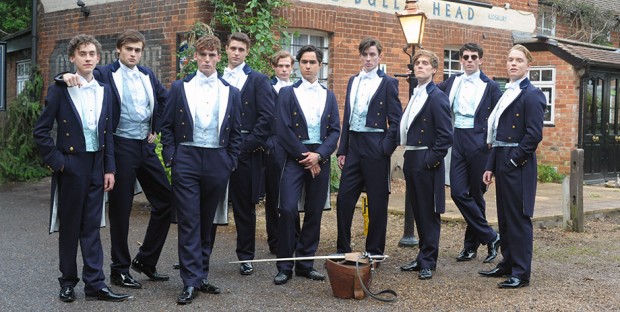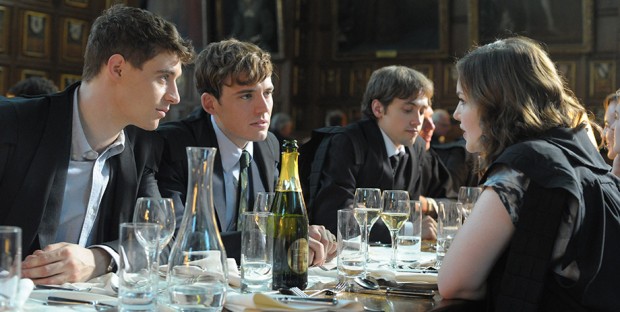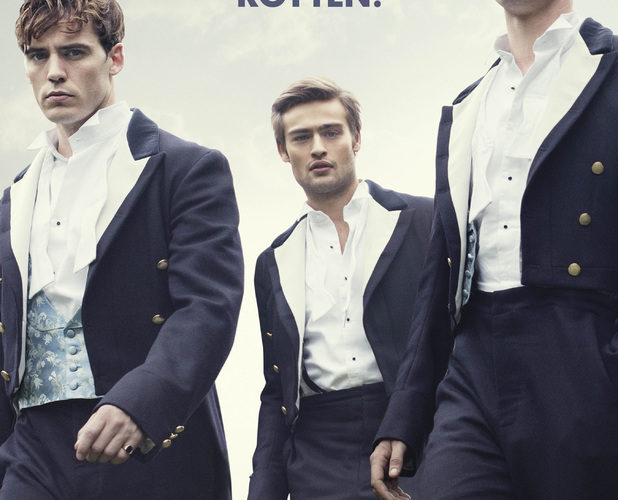I’ll bet Laura Wade’s 2010 play Posh is something special to see on stage. A fictionalized take on Oxford University’s exclusive Bullingdon Club, it’s debaucherous centerpiece of a banquet has to be an invigorating experience live. I say this because its depiction in Lone Scherfig’s film The Riot Club (adapted by Wade herself) is a brilliantly choreographed sequence of status disparity, entitlement, embarrassment, and the cowardice of boys who have never been in a position where personal integrity matters above surname. And if the movie were solely this forty-five or so minute circus it’d be a resounding success. Unfortunately it isn’t, as for us to understand these rascals, we must first meet them.
Our leads are sons of wealthy Brits who attended the best boarding/prep schools before following in their patriarchy’s footsteps to enjoy vandalizing college rooms as an initiation ploy and restaurants as part of their yearly evening of hedonistic excess. Because there are ten in the club it makes sense to focus on the two newest recruits: Alistair Ryle (Sam Claflin) and Miles Richards (Max Irons). As freshman just arrived, their introduction comes at the tail end of a power play by Mr. Ryle insisting his son receive the same room his brother had the previous year despite it already being assigned to Miles. The latter boy has no problem switching—after all, he’s a liberal posh who even finds a girlfriend (Holliday Grainger‘s Lauren) well below his “position” considering Oxford enrollment isn’t enough for most Riot Clubers still believing in lineage and bloodline regardless of the crown itself being neutered. Either way, the exchange sets up the pair’s bitterly cruel rivalry.

My issue is that everything occurring during this build-up is obviously manipulating us in order for the final unsurprising minutes to play out as desired. Everything that happens outside of the dinner therefore proves less about the boys and more about the overarching lesson Wade is intent on providing via her machinations. She really didn’t have to, though, since what goes on while the ten boys are drunk and hostile proves her point succinctly and with a lot more impact than watching their “real world” conniving and maneuvering in a way that made me think she almost wanted us to feel pity for them. Even the idea of Miles dating a commoner becomes less politically charged and more a means for additional drama later. This isn’t necessarily bad except that the film posits such instances as natural.
This is why I believe the play would be more convincing. The stage lends a sensibility for over-the-top performances and a more keenly orchestrated satirical bent. Because Scherfig’s movie is so serious, we can see the strings clearer. The simple fact Alistair and Miles switch rooms, begin to hate each other as writing class partners, and just happen to also become the only two new members of the club begs us to smile at the artifice and yet the way its presented as authentic coincidence only elicits eye-rolls at its convenience. Scherfig either needed to allow her cast to ham it up or ensure the tone went farther into comedy for us to suspend disbelief. As it is, the beginning’s best described as boring, the end overly sanctimonious, and the middle proof a fantastic film was possible.
The latter sentiment is the greatest crime because that dinner scene packs a forceful punch. We can pretty much guess how it’s all going to shake out with its escalation of attitude, political rhetoric turning violent, and a tantrum-inducing series of disappointments spoiled-rotten children aren’t equipped to handle. Yet its growing tension and our increasing adrenaline are paced to perfection until its crack of a bat finale. This is where the supporting players come into their own too with Sam Reid‘s Hugo basking in his smugness, Jack Farthing‘s George languishing in vacant-eyed eccentricity, and Ben Schnetzer‘s Dimitri embracing his money as a means to get over the constant ridicule thrown at his Greek heritage. Even Douglas Booth‘s usually too nonplussed exterior as Harry Villiers gets frayed when his plan to hire a prostitute (Natalie Dormer) goes awry.
While they all step up to the plate in both provoking the two leads and denigrating the restaurant owner (Michael Jibson) and his waitress daughter (Jessica Brown Findlay) for being unfit of their respect, the sequence is very much owned by Claflin and Irons. Right from the beginning Irons shows displeasure at Alistair’s inclusion in the club opposite Claflin’s vehement disgust at Miles. Their combative natures turn much more pointed for one above the other and we see the potential for the difficult-to-endure violence that eventually erupts. As each drink is imbibed, the stakes grow; as each disrespect towards the club for being born into positions they admit prove frustrating considering they actually work hard chips at their resolve, the teetering balance tips towards a pitch black abyss of callous indifference.

We see the rage bubbling beneath the surface of Claflin’s skin—a desire to be more than his brother and father eating away until a sociopathic sense of entitlement remains. We accept Irons as the enlightened soul he is to bridge the societal gap and yet still covet a place at the table of an organization so emblazoned in secrecy and success as the Riot Club. One finds his courage and confidence grow with alcohol and the willing ears of compatriots easily riled up when they believe they’ve been provoked and the other shrinks smaller and smaller until the mistake he’s made is too far-gone to be corrected. Their evolutions at the dinner itself are so authentically painted through words and actions that they only make what comes before and after more artificial.
Add Grainger’s emotive performance playing the pawn between them who’s used and abused and The Riot Club is a razor-sharp look at excess and privilege during this contemporary Gosford Park-esque compartmentalized segment of purely rendered revulsion. Scherfig expertly mines the differing classes by shifting between Jibson and Brown Findlay in the kitchen and dining room, the customers growing tired of the boys’ noise in the next room, and the club itself playing by their own rules because they believe they can. Wade writes each confrontation between the three worlds with passion and bile that of course incites the action to come. I only wish she had the same fire outside the restaurant during both the expository moments and by-the-numbers examples of nepotistic disgust. As is, despite its rousing main event, the result is found lacking.
The Riot Club premiered at TIFF and will be released by IFC Films. See our complete coverage below.


